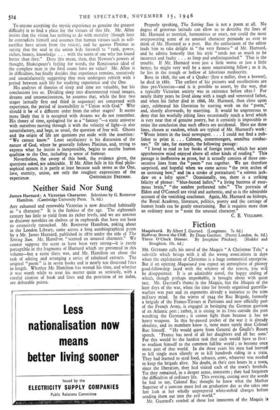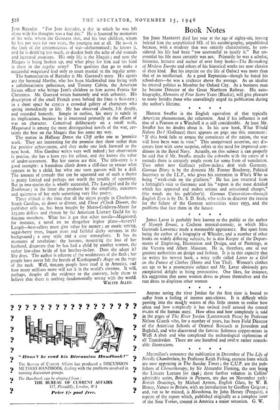Fiction
Maquisard. By Albert J. Guerard. (Longmans. 7s. 6d.) MR. GUERARD calls his novel of the Maquis " A Christmas Tale," a sub-title which brings with it all the wrong associations in days when the exploitation of Christmas is a huge commercial enterprise. But if on opening Maquisard you expect an atmosphere of phoney good-fellowship laced with the whimsy of the season, you will be disappointed. It is an admirable novel, the happy ending of which, though perhaps improbable, is brought about with quiet tact. Mr. Guerard's theme ;is the Maquis, but the Maquis of the later days of the war, when the time for loosely organised guerrilla- warfare was past and its exponents already a nuisance to the trim military mind. In the winter of 1944 the Ruc Brigade, formerly a brigade of the Francs-Tireurs et Partisans and now officially part of the French Army, is engaged in besieging the German garrison of an Atlantic port ; rather, it is sitting in its lines outside the port watching the Germans ; it cannot fight them because it has no heavy weapons. In this by-passed pocket of the war it is already obsolete, and its members know it, none more surely than Colonel Ruc himself. " He would quote from General de Gaulle's Rouen speech. ' France has need of all her daughters and all her sons.' For this would be the hardest task that each would have to face: to readjust himself to the common fallible world ; to become once more part of that world. In the three years his men had learned to kill single men silently or to kill hundreds riding in a train. They had learned to steal food, tobacco, arms, whatever was needed to keep the brigade alive. No doubt, in their rare hours in a town, since the liberation, they had visited each of the town's brothels. Yet they remained, in a deeper sense, innocents ; they had forgotten the difficulties of ordinary life. This evening, casting over the words he had to say, Colonel Ruc thought he knew what the Mother Superior of a convent must feel on graduation day as she takes one last look at her wholly unprepared white-robed charges before sending them out into the evil world."
Mr. Guerard's symbol of these lost innocents of the Maquis is
Jean Ruyader. " For Jean Kuyader, a day in which he was left alone with his thoughts was a bad day." He is haunted by memories of his wife, whom the Germans shot-, and his four children, whom he has not seen for two years, the youngest not at all. He is—it is the fault of.. the circumstances of war—dehumanised ; he knows it, and he is drink.ng too much, to deaden both the ache of old wounds and lacerated emotions. His only life is the Maquis ; and now the Maquis is being broken up, and what place for him and his kind is there in the regular army? The qualities that go to make a successful maquisard lead only to court martial in the regular army.
The humanisation of Ruyader is Mr. Guerard's story. His agents are the barmaid Marthe, who has been blackmailed into living with a collaborationist policeman, and Tommy Colvin, the American liaison officer who brings Jean's children to him across France for Christmas. Mr. Guerard writes humanely and with urbanity. His description of the small French town behind the lines is first-rate ; in a short space he creates a crowded gallery of characters who spring immediately to life. He has observed closely, felt deeply, and recorded honestly. Simple in outline, his story is subtle in its implications, because he is interested primarily in the effects of war on character. Conceived deliberately on a small scale, Maquisard is among the most distinguished novels of the war, cer- tainly the best on the Maquis that has come my way. The stories in Halfway Down the Cliff strike one as 'prentice work. They are interesting for the promise they show rather than for positive achievement, and they make one look forward to the next book. Miss Gardner writes very well indeed ; her observation is precise, she has a keen eye for colour, and she knows the value of under-statement. But her stories are thin. The title-story is a good example: a hazardous climb down a cliff-face to rescue what appears to be a child, but what one soon guesses will be a doll. The amount of comedy that can be squeezed out of such a theme is pretty limited and perhaps not worth the trouble of squeezing. But in two stories she is wholly successful,. The Landgirl and In the Boathouse ; in the latter she produces by the simplicity, exactness and quietness of her style something very like poetry. Three o'clock is the time that all the nicest people in Charleston, South Carolina, sit down to dinner, and Three o'Clock Dinner, the publisher tells us, has been bought by Metro-Goldwyn-Mayer for 125,000 dollars and chosen by the American Literary Guild for its 600,000 members. What has it got that other novels—Maquisard, for instance, a novel on an altogether higher plane—haven't? • Length—best-sellers must give value for money ; an exotic setting, sugar-berry trees, loquat trees and faithful darky servants in the background ; a cosy style and a cosy atmosphere. It has its moments of revelation: the heroine, Mourning the loss of her husband, discovers that he has had a child by another woman, the rather low-class bride of her brother-in-law. Does she adopt it? She does. The author is tolerant of the weaknesses of the flesh ; her people have never felt the breath of Kierkegaard's Angst on the nape of the neck. Well, 600,000 people have read it in America, and how many millions more will see it in the world's cinemas. It will, perhaps, despite all the evidence to the contrary, help them to believe that there is nothing fundamentally wrong with the world.
WALTER ALLEN.



































 Previous page
Previous page